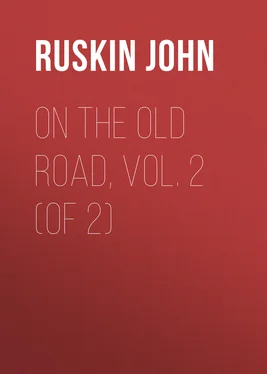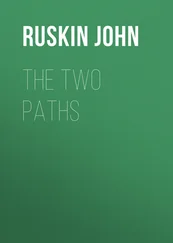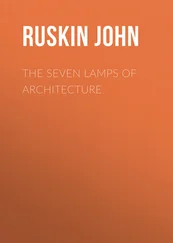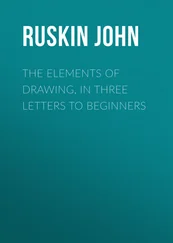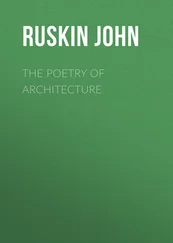John Ruskin - On the Old Road, Vol. 2 (of 2)
Здесь есть возможность читать онлайн «John Ruskin - On the Old Road, Vol. 2 (of 2)» — ознакомительный отрывок электронной книги совершенно бесплатно, а после прочтения отрывка купить полную версию. В некоторых случаях можно слушать аудио, скачать через торрент в формате fb2 и присутствует краткое содержание. Жанр: foreign_antique, foreign_home, literature_19, visual_arts, на английском языке. Описание произведения, (предисловие) а так же отзывы посетителей доступны на портале библиотеки ЛибКат.
- Название:On the Old Road, Vol. 2 (of 2)
- Автор:
- Жанр:
- Год:неизвестен
- ISBN:нет данных
- Рейтинг книги:3 / 5. Голосов: 1
-
Избранное:Добавить в избранное
- Отзывы:
-
Ваша оценка:
- 60
- 1
- 2
- 3
- 4
- 5
On the Old Road, Vol. 2 (of 2): краткое содержание, описание и аннотация
Предлагаем к чтению аннотацию, описание, краткое содержание или предисловие (зависит от того, что написал сам автор книги «On the Old Road, Vol. 2 (of 2)»). Если вы не нашли необходимую информацию о книге — напишите в комментариях, мы постараемся отыскать её.
On the Old Road, Vol. 2 (of 2) — читать онлайн ознакомительный отрывок
Ниже представлен текст книги, разбитый по страницам. Система сохранения места последней прочитанной страницы, позволяет с удобством читать онлайн бесплатно книгу «On the Old Road, Vol. 2 (of 2)», без необходимости каждый раз заново искать на чём Вы остановились. Поставьте закладку, и сможете в любой момент перейти на страницу, на которой закончили чтение.
Интервал:
Закладка:
186. It has been suggested that the Academy now consisting of forty-two might be increased advantageously to fifty professional members, architecture, sculpture, and painting being fairly represented, and that in addition to those fifty there might be elected or nominated somehow or other ten non-professional persons, that is, men taking an interest in art, who had a certain position and standing in the country, and who might take an active part in the management of the affairs of the institution, so tending to bring the Royal Academy and the public together?—I do not know enough of society to be able to form an opinion upon the subject.
Irrespective of society, as a question of art, you know enough of non-professional persons interested in art to judge as to whether the infusion of such an element into the Academy might be of advantage to the Academy and to art generally?—I think if you educate our upper classes to take more interest in art, which implies, of course, to know something about it, they might be most efficient members of the Academy; but if you leave them, as you leave them now, to the education which they get at Oxford and Cambridge, and give them the sort of scorn which all the teaching there tends to give, for art and artists, the less they have to do with an academy of art the better.
Assuming that, at present, you have not a very great number of those persons in the country, do you not think that the mere fact of the adoption of such a principle in any reform in the constitution of the Academy might have the effect of turning attention more to this matter at the Universities, and leading to the very thing which you think so desirable?—No, I should think not. It would only at present give the impression that the whole system was somewhat artificial, and that it was to remain ineffective.
Notwithstanding the neglect of this matter at the Universities, do you think, at the present moment, you could not find ten non-professional persons, of the character you would think desirable, to add to the Academy?—If I may be so impertinent, I may say that you as one of the upper classes, and I as a layman in the lower classes, are tolerably fair examples of the kind of persons who take an interest in art, and I think both of us would do a great deal of mischief if we had much to do with the Academy.
187. Assuming those two persons to be appointed lay members, will you state in what way you think they would do mischief in the councils of the Academy?—We should be disturbing elements, whereas what I should try to secure, if I had anything to do with its arrangements, would be entire tranquillity, a regular system of tuition in which there should be little excitement, and little operation of popular, aristocratic, or any other disturbing influence; none of criticism, and therefore none of tiresome people like myself;—none of money patronage, or even of aristocratic patronage. The whole aim of the teachers should be to produce work which could be demonstrably shown to be good and useful, and worthy of being bought, or used in any way; and after that the whole question of patronage and interest should be settled. The school should teach its art-grammar thoroughly in everything, and in every material, and should teach it carefully; and that could be done if a perfect system were adopted, and above all, if a few thoroughly good examples were put before the students. That is a point which I think of very great importance. I think it very desirable that grants should be made by the Government to obtain for the pupils of the Academy beautiful examples of every kind, the very loveliest and best; not too many; and that their minds should not be confused by having placed before them examples of all schools and times; they are confused enough by what they see in the shops, and in the annual exhibitions. Let engraving be taught by Marc Antonio and Albert Dürer,—painting by Giorgione, Paul Veronese, Titian and Velasquez,—and sculpture by good Greek and selected Roman examples, and let there be no question of other schools or their merits. Let those things be shown as good and right, and let the student be trained in those principles:—if afterwards he strikes out an original path, let him; but do not let him torment himself and other people with his originalities, till he knows what is right, so far as is known at present.
You are opposed, on the whole, to the introduction of the lay element?—Yes; but I am not opposed strongly or distinctly to it, because I have not knowledge enough of society to know how it would work.
Your not being in favor of it results from your belief that the lay element that would be useful to the Academy does not at present exist in this country; but you think, if it did exist, and if it could be made to grow out of our schools and universities by art teaching, it might, with advantage to the Academy and to artists, be introduced into the Academy?—Yes.
188. Supposing the class of Royal Academicians to be retained, and that you had fifty Royal Academicians, should you think it desirable that their works should be exhibited by themselves, so that the public might see together the works of those considered to be the first artists of this country?—Certainly, I should like all pictures to be well seen, but I should like one department of the exhibition to be given to the Associates or Graduates. I use that term because I suppose those Associates to have a degree given them for a certain amount of excellence, and any person who had attained that degree should be allowed to send in so many pictures. Then the pictures sent in by persons who had attained the higher honor of Royal Academician should be separately exhibited.
That would act as a stimulus to them to keep up their position and show themselves worthy of the honor?—Yes. I do not think they ought to be mixed at all as they are now.
189. What is your opinion with reference to the present system of traveling studentships?—I think it might be made very useful indeed.
On the one hand it has been suggested that there should be, as is the system adopted by the French Academy, a permanent professor at Rome to look after the students; on the other hand it has been said that it is not desirable, if you have those traveling studentships, that the students should go to Rome, that it is better for them to travel, and to go to Venice or Lombardy, and to have no fixed school in connection with the Academy at Rome. To which of those two systems do you give the preference?—I should prefer the latter; if a man goes to travel, he ought to travel, and not be plagued with schools.
It has been suggested that fellowships might be given to rising artists, pecuniary assistance being attached to those fellowships, the artist being required annually to send in some specimen of his work to show what he was doing, but it being left optional with him to go abroad or to work at home; should you think that would be desirable, or as has been suggested in a letter by Mr. Armitage, supposing those fellowships to be established for four years, that two of those years should be spent abroad and two at home?—Without entering into any detail as to whether two years should be spent abroad and two years at home, I feel very strongly that one of the most dangerous and retarding influences you have operating upon art is the enormous power of money, and the chances of entirely winning or entirely losing, that is, of making your fortune in a year by a large taking picture, or else starving for ten years by very good small ones. The whole life of an artist is a lottery, and a very wild lottery, and the best artist is liable to be warped away from what he knows is right by the chance of at once making a vast fortune by catching the public eye, the public eye being only to be caught by bright colors and certain conditions of art not always desirable. If, therefore, connected with the Academy schools there could be the means of giving a fixed amount of income to certain men, who would as a consideration for that income furnish a certain number of works that might be agreed upon, or undertake any national work that might be agreed upon, that I believe would be the healthiest way in which a good painter could be paid. To give him his bread and cheese, and so much a day, and say, Here are such and such things we want you to do, is, I believe, the healthiest, simplest, and happiest way in which great work can be produced. But whether it is compatible with our present system I cannot say, nor whether every man would not run away as soon as he found he could get two or three thousand pounds by painting a catching picture. I think your best men would not.
Читать дальшеИнтервал:
Закладка:
Похожие книги на «On the Old Road, Vol. 2 (of 2)»
Представляем Вашему вниманию похожие книги на «On the Old Road, Vol. 2 (of 2)» списком для выбора. Мы отобрали схожую по названию и смыслу литературу в надежде предоставить читателям больше вариантов отыскать новые, интересные, ещё непрочитанные произведения.
Обсуждение, отзывы о книге «On the Old Road, Vol. 2 (of 2)» и просто собственные мнения читателей. Оставьте ваши комментарии, напишите, что Вы думаете о произведении, его смысле или главных героях. Укажите что конкретно понравилось, а что нет, и почему Вы так считаете.
